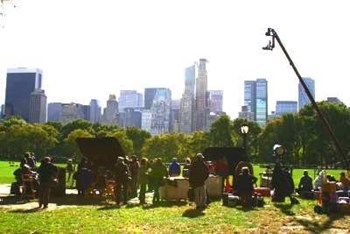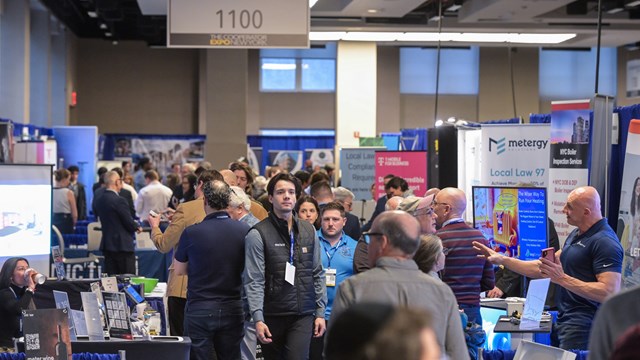
They torched cars and set fires throughout the park and around our building in 50 mile-per-hour winds. And, yes, the fire spread to unprotected areas.
It may sound like a scene from a war zone, but that's actually a local resident's description of a movie shoot that occurred recently in and around Washington Square Park. New York City has been an immensely popular movie location since American cinema began. The city lends just the right note of gritty reality or dreamy escapism to any movie's backdrop. However, real people reside in the buildings moviegoers see in street scenes—and these residents often have wildly different views on what it's like to have film crews at their front door.
Point and Shoot?
The crews shooting films, TV shows, commercials and music videos on the streets of New York City can't just miraculously appear outside an apartment building or in a lobby somewhere and "steal a shot"—student filmmakers and crafty indie directors are the only ones who can get away with that. Production companies are required to move through the proper bureaucratic channels and obtain the official permits that allow them to use the cityscape as a location for their fictional doings. In 2006, there was a record number of shooting days by the film industry in New York City locations (34,718 vs. 31,570 in 2005). Shooting days have more than doubled since 1993.
The governmental body that issues these permits is the New York City Mayor's Office of Film, Theatre and Broadcasting (MOFTB), an organization whose name adorns the credits of all mainstream productions shot in the five boroughs. According to Julianne Cho, associate commissioner of the office, "The Mayor's Office provides permits to shoot on city-owned locations, including streets. "We do not, however, provide permits to film producers to shoot on private property."
The process of acquiring a permit to shoot in the street outside a co-op or condo building is standardized. The permit is "free of charge" to the producer, and details are spelled out on the MOFTB's website (www.nyc.gov/ film). However, in order to obtain one, the producer must present an original certificate of insurance indicating the city as "additional insured" for "at least one million dollars…for each instance of the claim."
Once a producer has the mandatory insurance in hand, he or she is required to hold a pre-production meeting with representatives from the OFTB no less than five days before the shoot. Generally, the production manager and location manager attend this meeting. After the meeting, an application for a permit can be submitted. The turnaround for the permit can be as short as one day, providing the application is filed by noon the day before.
Take it Inside
The above process covers shoots that take place outside a co-op or condo - but what about those crews that want to shoot inside the building? The process of securing an indoor shoot "happens very quickly," according to Steven R. Wagner, a partner with Manhattan-based law firm Wagner Davis PC. "There's usually not enough time to have a board meeting. Once a production company has decided on a location, the managing agent or super is contacted, and a form of agreement is drawn up," Wagner says. This agreement grants a license to the company, and the company is then referred to the building's legal counsel—who may have some very specific opinions on the execution of the project.
"I am very concerned about the type of movie the building is going to be in," says Wagner. "I don't want anything that will reflect negatively on the reputation of the building. I also want to make certain [the production crew] have any permissions or permits that are required for the shoot."
Jim Flaherty, director of management at Century Management in Manhattan, concurs with Wagner about the nature of a film/program being a key factor in deciding whether to allow a shoot inside a given residential building. Flaherty also adds that, "Certain residents simply don't want to be bothered. Most of the higher-end buildings don't need the exposure, so a lot of my boards haven't allowed the crews in. The residents don't want anything that will disturb their normal routine."
Both Wagner and Flaherty stress the importance of the producer providing insurance to a building they wish to shoot at. "There are certain minimum amounts of insurance," says Wagner. "The producers we've dealt with have never provided anything less than a $20 million certificate of insurance that names the co-op or condo as 'additional insured parties.' This ensures they will leave the premises in their original condition."
Paying for the Privilege
There can be a certain amount of prestige involved in having one's building used in the movies or on television, but the biggest and most immediate advantage is always monetary. "Production companies will pay a significant amount of money" for the privilege of filming in certain New York City condos and co-ops, says Wagner. "They have money allocated for site location, so if they want to use your space, they'll pay. Your building will give them the 'perfect shot' they're looking for. That's what they want, and they'll pay for it."
In regards to the reactions from co-op and condo residents, Enma Baron, vice president of the Corcoran Group, speaks for many when she says, "The film shoots are somewhat disruptive for a neighborhood, but they happen all the time—New Yorkers have gotten used to them. At the end of the day, it brings about pride in the neighborhood, if it's displayed or showcased properly in the film."
Adelaide Polsinelli, president of the board of directors at Two Fifth Avenue, agrees, citing the case of the Al Pacino film People I Know, which was shot inside her building. "Having a film shot on the premises is worth doing, if you have the right attorneys negotiating a good contract," she says. "The film crew for Peoplewasn't intrusive or disruptive. They paid a considerable amount of money, gave us as much as we needed in insurance, and were so pleasant to deal with. The crew members were professional, never intrusive or disruptive."
The residents of Two Fifth Avenue had a worst-case scenario experience more recently, however, when a film crew shot scenes for Will Smith's horror/sci-fi remake I Am Legend outside their building and across the street in Washington Square Park. The way Polsinelli tells it, the October-November shoot was as nightmarish for local residents as the film's actual story line, about a man who literally finds himself the last human on earth.
"The crew closed our street to traffic and pedestrians at the busiest times of day," says Polsinelli. "The crew members were forbidding us to enter or leave our building at points. They went so far as to use our lobby as a 'holding pen' for the film's extras, which was a breach of security, as well as an invitation to liability."
And that was only the beginning. As the shoot proceeded, Washington Square was transformed into a post-apocalyptic wasteland for the picture. "They monopolized the park, and utilized stadium-bright spotlights that shone into our windows," says Polsinelli. "Cherry-pickers were outside our windows with crew members able to look in, and they set fire to—and exploded—cars over several nights."
Bruce Deitchman, another resident of Two Fifth Avenue, continues the tale of "apocalypse" in Washington Square. "The shoot was completely out of control," he says. "The crew members were particularly nasty to residents of the building throughout, and in the evenings they were burning and exploding cars in the park! Burnt rubber fumes came through our windows, causing me to have asthma attacks. I contacted the EPA, and someone got back to me saying it was an accident, that tires had gotten burnt when they were exploding one of the cars. I contacted the Parks Department, 311 and the NYPD, but nothing ever happened. The government agencies we contacted were also completely ineffectual."
Flaherty says that the residents of a building are "effectively helpless when it comes to stopping a movie shoot outside their premises. They can turn to management, but as long as the producers have their permits in order, there's not much the residents can do."
Polsinelli says she and her fellow Two Fifth Avenue residents contacted the city council and the mayor's office, among several other resources to complain about the shoot. "The crew effectively took away our options, and we wound up having zero percent say in the matter," she says.
One reason that resident complaints to city agencies can receive the most cursory of responses is—no surprise here—money. "In the case of the trees in the park that were destroyed during the shoot, we found out that a generous donation was made to the renovation project for Washington Square Park," says Polsinelli. To finally stem the tide of noise and untimely explosions, Polsinelli notes that "politically connected" tenants of Two Fifth Avenue were asked to intercede on the residents' behalf; their intercession brought about some much-needed relief.
In the wake of the shoot, Polsinelli, Deitchman and their fellow shareholders were left wondering what hit them. "The mayor talks a lot about the 'quality of life' in the city," says Deitchman. "They destroyed our quality of life for weeks—someone was asleep at the switch when the deal for this film shoot was cut." Now that the shoot is over, Polsinelli sums up residents' concerns by expressing her hope that the city will "better monitor these films crews after a permit is issued, to make sure that they are in full compliance during the filming."
Living in an iconic city like New York has its privileges—and its pains-in-the-neck. Having your home taken over by a film crew is one of the chances you take when you decide to make a home in the Big Apple. If you're fortunate enough to have a courteous, communicative production crew milling around, you're in luck—if not, your building's Hollywood experience could play out more like Rosemary's Baby than Breakfast at Tiffany's.
Ed Grant is a freelance writer and editor living in New York City.






3 Comments
Leave a Comment